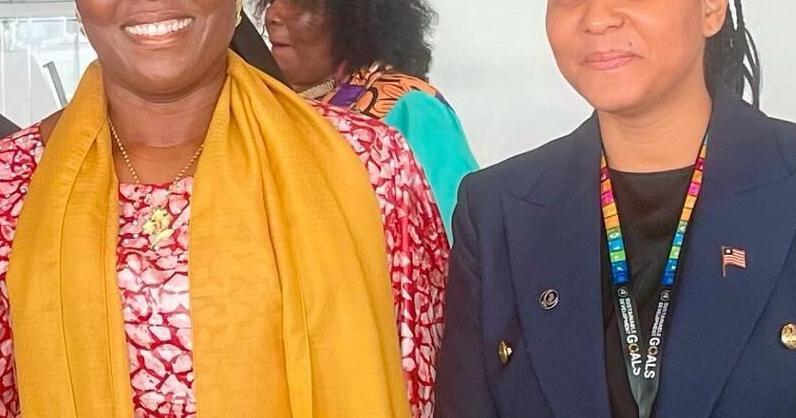Africa-Press – Liberia. In a major milestone for Liberian diplomacy, the Republic of Liberia has been elected to serve as a non-permanent member of the United Nations Security Council (UNSC) for the 2026–2027 term. This marks the country’s return to the Council for the first time since its inaugural term in 1961.
The historic achievement comes under the leadership of President Joseph Nyuma Boakai and Minister of Foreign Affairs, Madam Sara Beysolow Nyanti. However, central to this success was the strategic leadership of Assistant Minister for International Organizations, Karishma P. H. Pelham-Raad, who served as National Chairperson of Liberia’s Security Council bid.
Assistant Minister Pelham-Raad was officially appointed as National Chairperson on June 13, 2024, during a MICAT press briefing, where the Minister of Foreign Affairs entrusted her with the national responsibility to coordinate and lead Liberia’s campaign.
On June 3, 2025, Liberia secured 181 out of 187 votes during the UN General Assembly vote in New York, earning a resounding endorsement from the international community and reaffirming the country’s reemergence as a credible voice on global peace and security.
“This campaign was about more than just winning a seat,” said Pelham-Raad following the announcement. “It was about telling Liberia’s story, one of resilience, transformation, and a deep commitment to peace and multilateral cooperation.”
Under her leadership, and in close collaboration with the Ministry of Foreign Affairs, Liberia’s Permanent Mission to the UN, and key regional partners, the campaign highlighted Liberia’s legacy of peacekeeping, democracy, and climate stewardship, particularly its protection of more than 44% of West Africa’s remaining rainforest.
During the campaign’s closing in New York, Foreign Minister Nyanti commended Pelham-Raad’s pivotal contribution to the effort.
“I want to acknowledge Assistant Minister Karishma Pelham-Raad for working diligently in ensuring that Liberia wins the non-permanent seat at the United Nations Security Council,” said Minister Nyanti. “A vote for Liberia is a vote for a vision, a vision for a more inclusive, responsive, and equitable Security Council.”
Minister Nyanti emphasized that Liberia’s candidacy was driven not by the desire for recognition, but by a readiness to assume global responsibility.
“Liberia does not ask for this seat as a reward. We ask for it as a responsibility, one we are prepared to shoulder with humility, courage, and the conviction that our shared peace depends on our shared action.”
“Liberia walked this path once before, in 1961. Today, over sixty years later, we return to the Council with renewed purpose and resolve,” she added.
Throughout the campaign, Pelham-Raad led targeted engagements with regional blocs, high-level summits, and multilateral dialogues, helping position Liberia as a capable and constructive partner on issues of peacekeeping, mediation, human rights, and climate justice.
The Minister of Foreign Affairs described Liberia’s election as “a resounding endorsement of Liberia’s emerging leadership in global peacebuilding,” and hailed Pelham-Raad’s leadership for its vision, professionalism, and effective execution.
“Our presence on the Council now reflects the voice of nations that have overcome adversity and now seek to lead with purpose,” Pelham-Raad remarked. “It is a powerful victory, not just for Liberia, but for the values we share with the world.”
Liberia will officially assume its seat on the Council in January 2026, joining Bahrain, Colombia, the Democratic Republic of Congo, and Latvia as new non-permanent members. They will replace Algeria, Guyana, the Republic of Korea, Sierra Leone, and Slovenia, whose terms conclude in December 2025.
The UN Security Council is composed of 15 members: five permanent members with veto power, The United States, United Kingdom, France, Russia, and China and ten non-permanent members elected for two-year terms.
With this election, Liberia begins a new chapter on the global stage not only as a nation with a proud past in peacekeeping and diplomacy, but as a symbol of hope, dialogue, and leadership in an increasingly complex world.
For More News And Analysis About Liberia Follow Africa-Press






